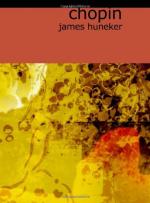Robert Schumann wrote of these Preludes: “I must signalize them as most remarkable. I will confess I expected something quite different, carried out in the grand style of his studies. It is almost the contrary here; these are sketches, the beginning of studies, or, if you will, ruins, eagles’ feathers, all strangely intermingled. But in every piece we find in his own hand, ‘Frederic Chopin wrote it.’ One recognizes him in his pauses, in his impetuous respiration. He is the boldest, the proudest poet soul of his time. To be sure the book also contains some morbid, feverish, repellant traits; but let everyone look in it for something that will enchant him. Philistines, however, must keep away.”
It was in these Preludes that Ignaz Moscheles first comprehended Chopin and his methods of execution. The German pianist had found his music harsh and dilettantish in modulation, but Chopin’s originality of performance—“he glides lightly over the keys in a fairy-like way with his delicate fingers”—quite reconciled the elder man to this strange music.
To Liszt the Preludes seem modestly named, but “are not the less types of perfection in a mode created by himself, and stamped like all his other works with the high impress of his poetic genius. Written in the commencement of his career, they are characterized by a youthful vigor not to be found in some of his subsequent works, even when more elaborate, finished and richer in combinations; a vigor which is entirely lost in his latest productions, marked by an overexcited sensibility, a morbid irritability, and giving painful intimations of his own state of suffering and exhaustion.”
Liszt, as usual, erred on the sentimental side. Chopin, being essentially a man of moods, like many great men, and not necessarily feminine in this respect, cannot always be pinned down to any particular period. Several of the Preludes are very morbid—I purposely use this word—as is some of his early music, while he seems quite gay just before his death.
“The Preludes follow out no technical idea, are free creations on a small basis, and exhibit the musician in all his versatility,” says Louis Ehlert. “No work of Chopin’s portrays his inner organization so faithfully and completely. Much is embryonic. It is as though he turned the leaves of his fancy without completely reading any page. Still, one finds in them the thundering power of the Scherzi, the half satirical, half coquettish elegance of the Mazurkas, and the southern, luxuriously fragrant breath of the Nocturnes. Often it is as though they were small falling stars dissolved into tones as they fall.”
Jean Kleczynski, who is credited with understanding Chopin, himself a Pole and a pianist, thinks that “people have gone too far in seeking in the Preludes for traces of that misanthropy, of that weariness of life to which he was prey during his stay in the Island of Majorca...Very few of the Preludes present this character of ennui, and that which is the most marked, the second one, must have been written, according to Count Tarnowski, a long time before he went to Majorca. ... What is there to say concerning the other Preludes, full of good humor and gaiety—No. 18, in E flat; No. 21, in B flat; No. 23, in F, or the last, in D minor? Is it not strong and energetic, concluding, as it does, with three cannon shots?”




